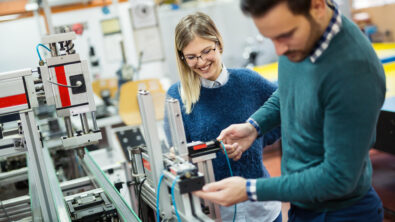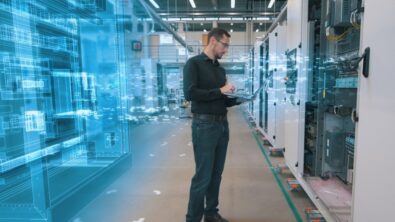Advanced Machine Engineering in the cloud is digitalizing next generation machines


Check out the engineering.com article by Rahul Garg, VP for Industrial Machinery & SMB Programs at Siemens Digital Industries Software. Rahul discusses emerging geopolitical issues impacting IT infrastructure simplification and technology that drive machine manufacturers to build smarter machines. These smarter devices will better address global competition, supply chain issues, shrinking margins, and growing energy, environmental, and government regulatory requirements.
Simultaneously, changing consumer preferences are causing product manufacturers to respond by developing highly agile, flexible machines that integrate hardware, software, and services to create many products in one collaborative environment.
Therefore, machine builders must engineer machines that increasingly integrate hardware, software, and services within one collaborative environment.
“Through these integrated tools, machine builders can incorporate greater automation and integrated quality into their products—driving greater efficiency into their processes while helping to differentiate themselves from other market players competitively. But, of course, that requires smarter software solutions to support machine design and manufacturing,” says Rahul Garg
Advanced Machine Engineering (AME) is coming to the fore as a digital method that drives assurance in creating next-generation machines.
“It delivers a cloud-based, digital thread approach that empowers companies to develop increasingly complex machines faster, lowering development costs and leads to decreased production and operational costs,” says Garg.
AME comes together with digital twin development of the mechanical, electrical, electronics and software engineering disciplines collaborating into a single source of truth—breaking down engineering silos and streamlining the communications essential for designing advanced machines. Subsequently, companies can better manage their projects, employing complexity to deliver lucrative machines and gain a competitive advantage.
Cloud-optimized project management
The cloud is essential for AME to possess its full potential, assisting teams to build smarter machines more rapidly. Using the cloud galvanizes collaboration to support multiple engineering disciplines.
“Cloud-based solutions allow the mechanical, electrical, automation and software disciplines to amalgamate under one space. The cloud is easily accessible to all and provides visibility into each discipline’s work stream, maximizes data reuse, supports an integrated change process and can ensure a standard delivery process while quickly adapting to evolving best practices,” says Rahul.
Cloud-based collaboration allows physical and remote employees to work under an integrated platform. When workers are aligned in the cloud, engineering teams can store, access, and utilize real-time dashboards, schedules, and documents anytime and anywhere. It drives efficiency into the machine development processes to improve productivity.
These capabilities allow organizations to see how a project progresses while gaining better traceability. The project data can be found, shared, and scaled throughout the organization to promote improved remote collaboration. At the same time, machine builders can capture and incorporate design feedback from several stakeholders to create the most effective machines without delays or high costs. Machine builders can address supply chain issues and source materials vendors when they include input early in the design process.
Connected engineering in the cloud with a digital twin
Furthermore, a digital twin provides a multi-disciplinary model of a machine. It collaborates with mechanical, electrical, and automation engineers to evaluate the performance, energy use, output, and essential indicators that enable multiple disciplines to work together.
Then closed-loop testing enhances the analysis to produce flexible and optimized machines that control engineering data from all disciplines in one change process. Digital twin benefits are realized using cloud-based technology, merging the engineering disciplines online and offline and combining their input and data.
Learn more about advanced machine engineering at Siemens.
Check out Rahul’s article.
Siemens Digital Industries Software helps organizations of all sizes digitally transform using software, hardware and services from the Siemens Xcelerator business platform. Siemens’ software and the comprehensive digital twin enable companies to optimize their design, engineering and manufacturing processes to turn today’s ideas into the sustainable products of the future. From chips to entire systems, from product to process, across all industries. Siemens Digital Industries Software – Accelerating transformation.


